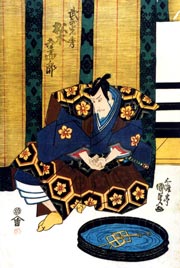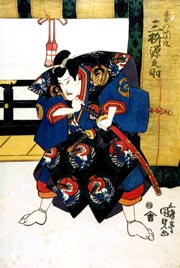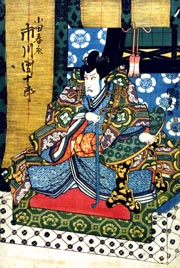| BADARAI NO MITSUHIDE |
| Play title | Toki-ha Ima Kiky˘ no Hataage Toki-mo Kiky˘ Shusse no Ukej˘ |
||||||||
| Author | Katsu Hy˘z˘ I | ||||||||
| History |
This drama is a five-act play which was written by Katsu Hy˘z˘ I and was first performed in the 7th lunar month of 1808 [1] at the Ichimuraza, under the title "Toki-mo Kiky˘ Shusse no Ukej˘" [casting]. Because of strict censorship, Katsu Hy˘z˘ I had to change the names of the main characters:
This drama was reduced to a 3-act one during the Meiji era and received the title "Toki-ha Ima Kiky˘ no Hataage". |
||||||||
| Structure |
The current version of "Badarai no Mitsuhide" is made up of two acts (3 scenes) or 3 acts (3 scenes): "Ky˘˘" ("the Banquet" - it is also called "Mikenwari", "the hit between the eyebrows"), "Honn˘ji Badarai" (the badarai scene at the Honn˘ji Temple) and "Atagoyama Renga" (linked haiku on Mount Atago). |
||||||||
| Key words | Badarai Honn˘ji Jidaimono Mashiba Hisayoshi Oda Harunaga Sengoku Jidai Taik˘ki Takechi Mitsuhide |
||||||||
| Summary |
Ky˘˘ Oda Harunaga, a military baron, has succeeded in uniting much of the nation under his rule. He is granted a post of minister by the imperial court as a result. The imperial-messenger is bearing the message in order to be feted at Honn˘ji Temple. Harunaga has put Akechi Mitsuhide in charge of the preparation for the formal event. Mitsuhide is one of Harunaga's able retainers. On the day of the event, v's sister Kiky˘, who is in service as lady-in-waiting to Harunaga, is assisting Mitsuhide at Honn˘ji Temple. Yamaguchi Genba who is a retainer of Harunaga loves Kiky˘. When he tries to make love to her at that day, she runs away from him because she doesn't love him. And she accidentally breaks off the branch of a plant that was to be presented to Harunaga. Kiky˘ is about to commit a suicide in remorse, but she is stopped by Mitsunaga. Presently Harunaga comes to inspect the preparations for the feast, but he is disappointed very much. Because there are the banners of Mitsuhide's blazon in the hall instead of the Oda blazon, and they are the "Kiky˘" Chinese bell-flower. And Harunaga feels that Mitsuhide is making too much preparations for the feasting of the imperial-messenger in order to advance himself at the expense of his master Harunaga's prestige. Harunaga who has nature of violent temper is angry so much with Mitsuhide, and he orders Ranmaru to beat Mitsuhide using his iron battlefield fan. Ranmaru who is a beautiful young man is a retainer of Harunaga, and he does everything that his lord orders. Mitsuhide receives a humiliating scar on his forehead. The imperial emvoy's arrival is announced. Harunaga dismisses Mitsuhide from his responsible charge and orders Ranmaru instead to take over. Harunaga and his troupe leave from the room, but Mitsuhide is there alone. Mitsuhide stares the battlefield fan with which Ranmaru beat him. And Ranmaru has watched the look of Mitsuhide secretly. Honn˘ji Badarai Kiky˘, a lady-in-waiting of Harunaga, who is a younger sister of Mitsuhide arranges flowers for Harunaga at Honn˘ji Temple. There is the other flower arrangement that Hisayoshi presents for Harunaga. Hisayoshi, who is Harunaga's retainer is one of the Mitsuhide's rival. The flower arrangement is making use of a "horse-tub" that is Japanese badarai that is a container ordinarily used to hold water for washing of horse hooves. The unusual arrangement catches Harunaga's attention, and he feels interesting in it. Harunaga notices the other flower arrangement that was made by Kiky˘. She used hydrangea. Hydrangea change its color, so Harunaga thinks that it means his uniting nation change its lord easily. Harunaga is displeased very much. Kiky˘ apologizes to Harunaga at once. She wanted just to get Harunaga's favor for her elder brother Mitsuhide. And Harunaga's retainers advise to him that Mitsuhide is innocent. Ranmaru says to believe Mitsuhide honesty. Harunaga agrees and he summons Mitsuhide to the room. Mitsuhide comes to the room. Harunaga orders to bring Sake in "horse-tub", and he orders Mitsuhide to drink it. Mitsuhide drinks it, because Harunaga who is his lord ordered. Harunaga is displeased, because Mitsuhide didn't get emotional. Then Harunaga throws a horse bit toward Mitsuhide, and says to go to the battlefield where Hisayoshi is fighting. It means Mitsuhide goes there as a horse of Hisayoshi, he isn't a general any more. Harunaga applauds Ranmaru, because he advised to believe Mitsuhide honesty. Harunaga takes Mitsuhide's feudal land away to give to Ranmaru. Mitsuhide isn't a feudal land master any more. Harunaga has a Japanese sword called Hiyoshimaru that Mitsuhide has asked to give him. Harunaga gives it to Nagao Yataro who is a retainer of Harunaga. Mitsuhide is surprised and disappointed very much.. He can't get the sword any more. Harunaga orders to bring a white box to give to Mitsuhide instead of the sword, Hiyoshimaru. When Mitsuhide opens the box, he finds woman's hair in it. He notices that it was his wife's hair. Long ago, Mitsuhide was an lord-less retainer. When a visitor came to his house, his wife sold her hair to make dinner, because Mitsuhide was poverty. Harunaga talks about this story to everyone there. The man who bought the hair was Harunaga's spy. Harunaga heard it from the spy, he decided Mitsuhide to take into the service of him as a retainer. Harunaga says Mitsuhide forgot his favor. Harunaga and his troupe leave from the room. Kiky˘ is still there, and she tries to speak to her elder brother but she can't say anything. Mitsuhide says to go home alone earlier than him. Mitsuhide feels his memory was sullied. Mitsuhide stares a horse bit that Harunaga threw. And he takes it in his inside breast. Then he stands up slowly, and groans. Atagoyama Renga Mitsuhide is waiting for a messenger of Harunaga at his study of the quarters. Kiky˘ brings a letter to Yasuda Sakubŕ who is Mitsuhide's retainer. The letter orders Sakubŕ to gather the troops and to withdraw from Mount Atago. It means that Mitsuhide doesn't intend to join in Harunaga's campaign. But there is another message in the order. It hurries off Sakubŕ from the quarters. Satsuki, Mitsuhide's wife, hears about details of Mitsuhide's trouble from Kiky˘, and is disappointed very much. She feels it was her fault. Harunaga's two messengers have arrived. One of them is Nagao who was given the Japanese sword Hiyoshimaru by Harunaga. Mitsuhide greets the messengers who brought his death. When the massage that Harunaga wrote is read aloud, a sudden gust of wind blows out the lamp. Mitsuhide undresses in the dark. Satsuki brings a light, and she is surprised very much. Because Mitsuhide is wearing the white death garments under the clothes. In the message, Harunaga ordered to take Mitsuhide's feudal land away officially. If Mitsuhide refused it, he should die. The messengers understand his mind by the white death garments. Mitsuhide asks Nagao to behead him by Hiyoshimaru. Nagao accepts Mitsuhide's last favor. Mitsuhide stares the sword, and he takes it suddenly. Two messengers are killed by Hiyoshimaru in a moment. Mitsuhide's retainer comes running in to report that his troops have finished to surround Honn˘ji Temple. The other message of the order that he gave to Sakubŕ was to attack to Honn˘ji Temple, Harunaga. That night , Harunaga is killed in Mitsuhide's surprise attack on the temple. This summary was written by Sekidobashi Sakura (September 2000) and Sh˘riya Aragor˘ (August 2008) |
||||||||
| Trivia |
There are two sets of kata for the role of Mitsuhide: the kata which were crafted by Ichikawa Danjűr˘ IX (in a tachiyaku approach to the role) and the ones which were crafted by Ichikawa Danz˘ VII (in a katakiyaku approach to the role). Depending on the production, Yasuda Sakubŕ is sometimes called Shih˘ten Tajima-no-Kami. |
||||||||
| Notes |
[1] It was premiered in Edo at the Ichimuraza in the 25th day of the 7th lunar month of the 5th year of the Bunka era, which was the 15th of September 1808 in the western calendar. |
 |
 |
 |
|
The actors Matsumoto K˘shir˘ V, Mimasu Gennosuke I and Ichikawa Danjűr˘ VII playing the roles of
Takechi Mitsuhide, Mori no Ranmaru and Oda Harunaga in the drama "Toki-mo Kiky˘ Oda no Dekiaki",
which was staged in the 9th lunar month of 1825 at the Nakamuraza |
||
|
|
| Contact | Main | Top | Updates | Actors | Plays | Playwrights | Programs | Links | FAQ | Glossary | Chronology | Illustrations | Prints | Characters | Derivatives | Theaters | Coming soon | News |